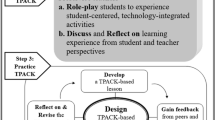Abstract
Information technology holds the promise of increased productivity. However, rapidly evolving tools require a professional able to incorporate these tools into their careers effectively, which signals the need for IT curriculum development initiatives that incorporate the use of complex, domain-specific IT applications in specific professional fields. This paper reports on a study that addresses this need, by developing, assessing and refining a curriculum development framework. The Information Technology Fluency (ITF) framework is a methodology for constructing components (case studies) for inclusion into existing or newly proposed courses to help students develop the skills needed for this challenge. Results obtained using the framework are reported, compared to similar work at a different institution, and used to suggest improvements to the framework.
Similar content being viewed by others
References
Aiken, R., Kock, N., and Mandviwalla, M. (2000) Fluency in information technology: A second course for non-CIS majors. ACM SIGCSE Bulletin, 32(1), 280–284.
Card, S., Moran, T., and Newell, A. (1983) The Psychology of Human-Computer Interaction. Erlbaum, Hillsdale, NJ.
Carroll, J. M. (1990) The Nurnberg Funnel. MIT Press, Cambridge, MA.
Carroll, J. M. (1998) Minimalism Beyond the Nurnberg Funnel. MIT Press, Cambridge, MA.
Computer Science and Telecommunications Board (CSTB) (1999) Being Fluent with Information Technology. National Academy Press, Washington, DC.
Denning, P. J. (2000) A commentary on fluency in information technology. Inventio (online journal), 1(2), www.doiiit.gmu.edu/Archives/spring00/pdenning_1.html.
Knowles, M. (1975) Self-Directed Learning. Follet, Chicago, IL.
Knowles, M. (1984a) The Adult Learner: A Neglected Species. Gulf Publishing, Houston, TX.
Knowles, M. (1984b) Andragogy in Action. Jossey-Bass, San Francisco, CA.
Papert, S. (1980) Mindstorms: Children, Computers and Powerful Ideas. Basic Books, New York, NY.
Papert, S. (1993) Childrens' Machines: Rethinking Schools in the Age of the Computer. Basic Books, New York, NY.
Pask, G. (1975) Conversation, Cognition, and Learning. Elsevier, New York, NY.
Salomon, G. (1979) Interaction of Media, Cognition, and Learning. Jossey-Bass, San Francisco, CA.
Salomon, G. (1981) Communication and Education. Sage, Beverly Hills, CA.
Salomon, G., Perkins, D., and Globerson, T. (1991) Partners in cognition: Extending human intelligence with intelligent technologies. Educational Researcher, 20(4), 2–9.
Spiro, R. J. and Jehng, J. (1990) Cognitive flexibility and hypertext: Theory and technology for the non-linear and multidimensional traversal of complex subject matter. In Cognition, Education, and Multimedia, D. Nix and R. Spiro (eds), Erlbaum, Hillsdale, NJ.
Spiro, R. J., Feltovich, P. J., Jacobson, M. J., and Coulson, R. L. (1992) Cognitive flexibility, constructivism and hypertext: Random access instruction for advanced knowledge acquisition in Ill-structured domains. In Constructivism and the Technology of Instruction, T. Duffy and D. Jonassen (eds), Erlbaum, Hillsdale, NJ.
Van Der Meij, H. and Carroll, J. M. (1995) Principles and heuristics for designing minimalist instruction. Technical Communications, 42(2), 243–261.
Author information
Authors and Affiliations
Rights and permissions
About this article
Cite this article
Dougherty, J.P., Kock, N.F., Sandas, C. et al. Teaching the Use of Complex IT in Specific Domains: Developing, Assessing and Refining a Curriculum Development Framework. Education and Information Technologies 7, 137–154 (2002). https://doi.org/10.1023/A:1020305827078
Issue Date:
DOI: https://doi.org/10.1023/A:1020305827078




